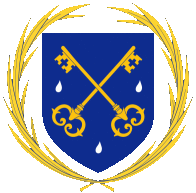
- This event has passed.
Chesterton Society Meeting
August 16, 2016
Good Day to you all!
The readings for our next meeting are:
The Everlasting Man, Chapter Seven, The War of the Gods and Demons.
Father Brown, this month we will be reading the story, The Pursuit of Mr. Blue.
Our meeting will be the third Tuesday of the month, August 16 in one of the classrooms at St. Stephen Catholic Church.
We are up to the seventh chapter of The Everlasting Man, where Chesterton describes what he sees as a pivotal event in ancient history.
The first six chapters were a whirlwind survey of the history of mankind leading up to the Greek and Roman civilizations; topics included the cave man, prehistoric man and civilizations, the dawn of history and comparative religions.
We need to remember that Chesterton wrote The Everlasting Man in response to the publishing of HG Wells, The Outline of History. Chesterton saw in that book an apology for materialist and evolutionary thinking; an ideological work of historical and scientific propaganda. The Everlasting Man was an attempt to set the record straight. Chesterton pointed out non sequiturs, ideological assumptions and outright fabrications. But beyond that, Chesterton goes on to lay out a map or diagram of history, with Jesus Christ as the focal point.
For the last three months we have been going over Chesterton’s scheme of “comparative religion” and general descriptions of the main pagan religions. He did this to show Christianity cannot just be placed alongside other world religions; and also the create a picture in our minds of what the worlds philosophies and religions were really like. And this emphasis on religion is in keeping with what Chesterton has written elsewhere, that the most important thing to know about a man is his philosophy, or view of ultimate things. He has little patience with those schools of thought that would try to place economics, for example, as the ultimate driving force of history. The masses are not moved to sacrifice themselves or their lives and families for the economic advantage of the nation, but only when they feel something of ultimate importance is at stake.
But now, after this sweeping survey of antiquity and the main ancient religions and mythologies, in very broad strokes, he slows down to focus on what he considers a pivotal point in history before the advent of Christ – the Punic Wars. His scheme of surveying pagan religions now pays off, for as we progress through his narrative we can clearly see the chasm separating the religions/philosophies of Rome and Carthage.
Like most of these chapters in The Everlasting Man, Chesterton starts off slowly with introductory/preliminary material in the first half of the chapter, but then he picks up the pace for the second half. The second half of this chapter is quite riveting. There were names and places I didn’t know (like Cincinnatus, obviously, a man named after the city of Cincinnati), but I wasn’t about to interrupt the flow of the narrative to look them up. Chesterton’s writing at times can be SO good.
Happy reading!
Spencer


 5461 44th Street
5461 44th Street
